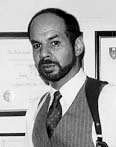
Jim Kouri
Increase in crime expected during economic crisis
By Jim Kouri
With the recession looming, some have speculated that the bad economy may be reflected in higher crime rates, according to Zoe Mentel, a policy analyst with with the Justice Department's COPS Office.
While a causal relationship between the economy and overall crime rates is highly debatable, the nation's current economic situation will likely affect certain types of crime that the law enforcement community must be prepared to confront.
For example, law enforcement agencies should take steps to counteract increases in crimes affected by the housing and foreclosure crisis. The incidence of mortgage fraud has increased steadily during the past few years, a trend which continues even with the decline in subprime lending. The Mortgage Asset Research Institute (MARI) reported a 45 percent increase in mortgage fraud in the second quarter of 2008, compared to the same period the year before, claimed Mentel in a COPS report.
Not surprisingly, the top three mortgage fraud states — Florida, California, and Illinois — also have high foreclosure rates. Increases in foreclosures also mean increases in vacant properties, which create opportunities for a variety of crimes, such as property theft, graffiti, and drug activity.
The COPS Office recently held three conference calls to address crimes related to the foreclosure crisis. Local and federal law enforcement practitioners, academics, members of private industry, and government officials participated in the conference calls to discuss mortgage fraud, vacant properties, and metal theft. In all three calls, experts from the field stressed the importance of educating the community to prevent these crimes and of building strong partnerships among law enforcement, private industry, community members, and other municipal agencies.
Law enforcement should also be prepared for a potential increase in incidents of domestic violence. In a recent interview, John Jay College of Criminal Justice Professor David Kennedy noted the connection between worsening economies and increases in domestic violence.
A research brief by the National Institute of Justice has also shown that domestic violence "occurs more in households facing economic distress" and suggests that law enforcement agencies concentrate specifically on disadvantaged neighborhoods, where rates of domestic violence are likely to be higher.
© Jim Kouri
January 22, 2009
With the recession looming, some have speculated that the bad economy may be reflected in higher crime rates, according to Zoe Mentel, a policy analyst with with the Justice Department's COPS Office.
While a causal relationship between the economy and overall crime rates is highly debatable, the nation's current economic situation will likely affect certain types of crime that the law enforcement community must be prepared to confront.
For example, law enforcement agencies should take steps to counteract increases in crimes affected by the housing and foreclosure crisis. The incidence of mortgage fraud has increased steadily during the past few years, a trend which continues even with the decline in subprime lending. The Mortgage Asset Research Institute (MARI) reported a 45 percent increase in mortgage fraud in the second quarter of 2008, compared to the same period the year before, claimed Mentel in a COPS report.
Not surprisingly, the top three mortgage fraud states — Florida, California, and Illinois — also have high foreclosure rates. Increases in foreclosures also mean increases in vacant properties, which create opportunities for a variety of crimes, such as property theft, graffiti, and drug activity.
The COPS Office recently held three conference calls to address crimes related to the foreclosure crisis. Local and federal law enforcement practitioners, academics, members of private industry, and government officials participated in the conference calls to discuss mortgage fraud, vacant properties, and metal theft. In all three calls, experts from the field stressed the importance of educating the community to prevent these crimes and of building strong partnerships among law enforcement, private industry, community members, and other municipal agencies.
Law enforcement should also be prepared for a potential increase in incidents of domestic violence. In a recent interview, John Jay College of Criminal Justice Professor David Kennedy noted the connection between worsening economies and increases in domestic violence.
A research brief by the National Institute of Justice has also shown that domestic violence "occurs more in households facing economic distress" and suggests that law enforcement agencies concentrate specifically on disadvantaged neighborhoods, where rates of domestic violence are likely to be higher.
© Jim Kouri
The views expressed by RenewAmerica columnists are their own and do not necessarily reflect the position of RenewAmerica or its affiliates.
(See RenewAmerica's publishing standards.)




















